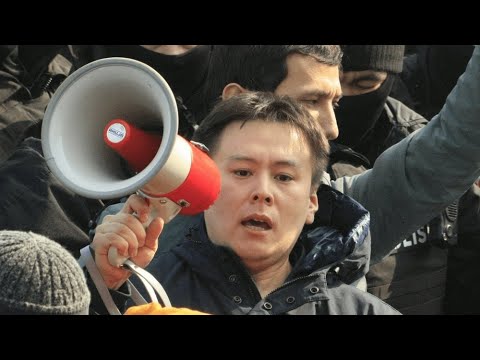Source: https://www.hrw.org/news/2022/06/13/kazakhstan-opposition-politician-could-face-10-year-sentence
(Berlin, June 13, 2022) – A prominent opposition figure in Kazakhstan faces up to 10 years in prison on charges of organizing mass riots and knowingly disseminating false information during January 2022 protests, Human Rights Watch said today.
The charges were filed on June 6 against Zhanbolat Mamay, a former journalist and the head of Kazakhstan’s unregistered Democratic Party. He has been in pretrial detention since February. The charges against Mamay should be dropped, and Mamay should be released, the organization said.
“A day after President Kassym-Jomart Tokaev stated that human rights are at the fore for Kazakhstan, the authorities bring baseless criminal charges against an opposition leader for exercising his rights to freedom of expression and peaceful assembly,” said Hugh Williamson, Europe and Central Asia director at Human Rights Watch. “The criminal case against Zhanbolat Mamay appears to be totally unfounded, and Kazakh authorities should release him immediately.”
On June 6, Mamay was designated a suspect in a criminal investigation into organizing mass riots accompanied by destruction of property and the use of violence on January 4-7, 2022, in Republic Square and other places in Almaty. The charges were brought under article 272 (1) “mass riots” and article 274 (4-2) “dissemination of knowingly false information” of Kazakhstan’s criminal code.
The indictment against Mamay refers to his participation in a peaceful rally on January 4. During the rally Mamay called for the dissolution of parliament and a more democratic government, open fair elections, political reforms, and registration of political parties. Mamay was detained on the evening of January 4 but released a few hours later. On January 5, unidentified men in civilian clothes attacked Mamay on his way to a second peaceful rally, after which his wife took him home and he stayed there receiving medical treatment.
In February, Mamay was sentenced to 15 days in detention for organizing an unsanctioned vigil to commemorate peaceful protesters who were killed by Kazakh security forces during the events. Mamay was due for release on March 12, but instead was rearrested on new criminal charges of insulting law enforcement officers in September 2021 and distributing “false information” in December 2021. On March 14 a court sent him to pretrial detention, where he remains.
Protests began on January 2 in Zhanaozen, western Kazakhstan, over increased energy prices, and spread quickly across the country, including to Almaty, with the focus widening to broader concerns about economic and political issues. After law enforcement forcibly dispersed peaceful protests in Almaty on January 4, rioters and some protesters attacked security forces and public buildings and looted shops. On January 5, President Tokaev declared a nationwide state of emergency.
The Kazakhstan government has yet to investigate the 232 deaths during the protests and the hundreds of allegations of torture and ill-treatment of protesters arrested following the January events.
But on June 6 it also opened a trial against Aidar Baisagatov, an activist, in a court in the city of Ust-Kamenogorsk, in eastern Kazakhstan. Baisagatov is accused of “use of violence against a representative of the authorities” under article 380 of the criminal code. Baisagatov was detained on January 3 in the city square while doing a live stream on Facebook, during which he expressed support for the protesters in Zhanaozen. On June 10, Baisagatov was released under house arrest while his trial is ongoing.
A court in the city of Shymkent, in northern Kazakhstan, sentenced another activist on June 6 in connection with the January events. Moldabai Sadibekov was sentenced to three years in prison for “organizing mass riots” under article 272 of the criminal code. Sadibekov went to a rally on January 5 to express his support for the protests and recorded the events on his phone. Sadibekov denies the charges and plans to appeal his sentence, media reported.
As a state party to the International Covenant on Civil and Political Rights, Kazakhstan has obligations not only to respect freedoms of expression and peaceful assembly, but to protect and facilitate these rights, as well as to guarantee the right to a fair trial.
“Kazakhstan should stop prosecuting political and civil activists for peacefully exercising their right to free speech during the January events,” Williamson said. “Instead it should set up an independent investigation involving national and international experts to establish what happened during these events and hold those responsible for grave human rights violations to account.”




GIPHY App Key not set. Please check settings